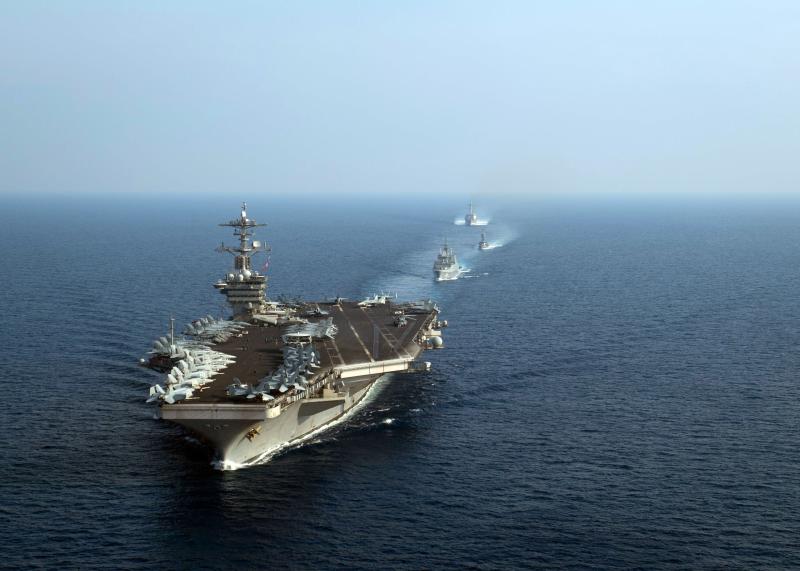South China Sea code 'should be binding', says Chinese scholar
Sign up now: Get insights on Asia's fast-moving developments

The aircraft carrier USS Theodore Roosevelt (CVN 71) leading a formation of US and Republic of Singapore navy ships during a photo exercise in the South China Sea on April 6, 2018.
PHOTO: AFP
BOAO (Hainan) - The Code of Conduct (COC) being negotiated between China and Asean should be legally binding to a certain degree, a Chinese scholar on the South China Sea has said.
"I believe that the Code of Conduct as an upgraded version of the DOC should have some legally binding force," said Dr Wu Shicun, head of the National Institute for South China Sea Studies, a think-tank in southern Hainan province.
DOC refers to the Declaration on the Conduct Parties in the South China Sea signed in 2002 between China and Asean countries.
It provides guidelines for behaviour in the disputed waters to prevent any escalation of tension.
Dr Wu said that in the long run, a rules-based South China Sea order is in line with the interests of all parties, including China. It can solve the urgent issues of crisis management and maintain peace and stability in the South China Sea region.
However, he added: "The purpose of the COC is to provide a mechanism to manage maritime crises and should not address disputes over territory and maritime jurisdiction."
Dr Wu was speaking on Wednesday (April 11) at a session on economic cooperation in the South China Sea on the last day of the annual Boao Forum on Asia that brings together government officials, academics and business leaders to discuss issues in Asia.
He later told The Straits Times that with the DOC not legally binding, Asean would not want a COC that was not binding in any way.
"A binding COC is in line with everyone's interest... if everyone obeys, then there will be order in the South China Sea," he added.
Referring also to the COC at the same session, Mr Jusuf Wanandi, senior fellow at Indonesia's Centre for Strategic and International Studies, said that "we are looking forward to a stronger, (legally) binding entity" that could prevent conflict and reduce tensions.
In his speech, Dr Wu noted that the situation in the South China Sea has calmed down following tensions in recent years as coastal states have shifted their focus from territorial and geopolitical disputes towards building of rules and mechanisms to manage the disputes.
However, he added that negative aspects that could lead to a re-escalation of tension still exist.
He proposed that apart from institution building - such as the COC - there should also be maritime cooperation to promote common development in the region. Among the projects he suggested were connectivity building, maritime tourism, and fish farming.
Mr Wanandi pointed out that cooperating with China on its Belt and Road Initiative to build infrastructure could bring about political stability and security in tandem with economic development.
However, Professor Paul Gewirtz of the Yale Law School cautioned that the world was watching the South China Sea to see what kind of rising power China is going to be.
"Will China be an expansionist power? If so, it's going to be resisted strongly," he said.
He added that China had succeeded in changing the situation on the ground that gave it a strong hand. While China should consolidate its gains, it should refrain from further unilateral steps that would create tension and focus instead on cooperation that was reassuring.


